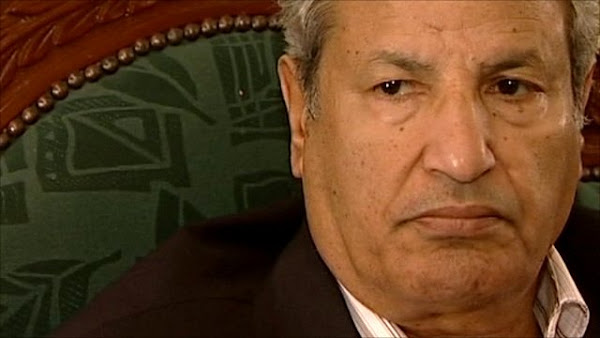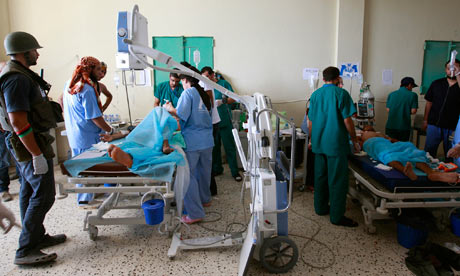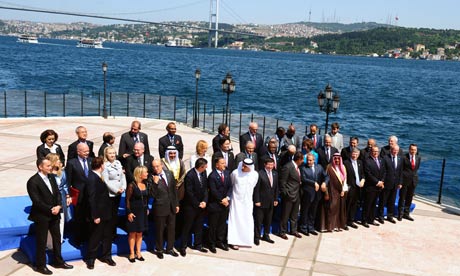Syrian security forces have reportedly killed more than 1,400 people and detained 10,000 others since March
Defectors of Syria’s security forces have described receiving orders from their superiors to fire live rounds at protesters to disperse them, according to Human Rights Watch.
The New York-based rights body released a statement on Saturday detailing interviews with eight soldiers and four members of secret security agencies it said had defected to the opposition since anti-government protests erupted in March.
The interviewees said they had participated in the government crackdown in the Syrian cities of Deraa, Izraa, Baniyas, Homs, Jisr al-Shughur, Aleppo, and Damascus, the capital.
The soldiers also reported participating in and witnessing the shooting and wounding of dozens of protesters, and the arbitrary arrests and detentions of hundreds of civilians.
All the interviewees told HRW that their superiors had told them that they were fighting infiltrators, salafists, and terrorists, but were surprised to encounter unarmed protesters instead. They said they were ordered to fire on the civilians, including children, in a number of instances.
The defectors also reported that those who refused orders to shoot on protesters ran the risk of being shot themselves. One of them said they witnessed a military officer shoot and kill two soldiers in Deraa for rejecting orders.
Syria's government has not responded to the allegations.
Human Rights Watch interviewed the defectors in person in Lebanon, Turkey, and Jordan. Most of the interviewees gave testimony on condition of anonymity for fear of reprisal.
"The testimony of these defectors provides further evidence that the killing of protesters was no accident but a result of a deliberate policy by senior figures in Syria to use deadly force to disperse protesters," said Sarah Leah Whitson, Middle East director at Human Rights Watch.
"Syrian soldiers and officials should know that they too have not just a right but a duty to refuse such unlawful orders, and that those who deliberately kill or injure peaceful protesters will be subject to prosecution."
"The accounts of soldiers who were horrified enough at their commanders’ orders and deceit to flee should send a message to the UN and other countries that they need to do more to put a stop to these brutal attacks on civilians," Whitson said.
Syrian security forces have killed more than 1,400 people and detained 10,000 others since March, according to Syrian rights groups.
Member of Syria's secret police - Homs
One member of Syria’s secret police - referred to locally as mukhabarat - told HRW he was deployed in Homs, Syria’s third largest city, on April 19, to help security forces violently disperse tens of thousands of protesters staging a sit-in in the central Clock Tower Square.
"The protesters had sat down in the square. We were told to disperse them with violence if needed. We were there with air force security, army, and shabbiha (armed supporters of the government who do not belong to security forces). At around 3:30am, we got an order... to shoot at the protesters. We were shooting for more than half an hour."
"There were dozens and dozens of people killed and wounded. Thirty minutes later, earth diggers and fire trucks arrived. The diggers lifted the bodies and put them in a truck. I don’t know where they took them. The wounded ended up at the military hospital in Homs. And then the fire trucks started cleaning the square."
Soldier of Presidential Guard - Damascus
A conscript who was a member of the Presidential Guard recounted how he was deployed on April 18 to Harasta, a suburb of Damascus, to quell a protest.
"They gave each one of us a Kalashnikov (rifle) with two magazines, and there was more ammunition in the vehicles. They also gave us electric tasers. They told us we were being sent to fight the gangs because security services needed reinforcement. We were surprised (when we got to Harasta) because we couldn’t see any gangs, just civilians, including some women and children, in the street, and members of the mukhabarat firing at them.
"I was in a group with five other soldiers from my unit. We received clear orders to shoot at civilians from the Presidential Guard officers and from the 4th military battalion, although normally we don't get orders from other units.
"The exact orders were "load and shoot." There were no conditions, no prerequisites. We got closer to the demonstrators, and when we were some five metres away, the officers shouted "fire!" At that moment, the five of us defected and ran over to the demonstrators’ side throwing our weapons to them while running away."
Sergeant Raqeeb Awwal - Al-Hara
Raqeeb Awwal, a first sergeant, who was posted in the southern town of al-Hara, near Deraa, described the orders his squad received when the army circled the town on May 10.
"Snipers were on rooftops. Their orders were, 'If anyone goes out on the street, detain or shoot'. I recall watching a guy go out to smoke outside and then being shot and killed by a sniper."
He also described the arrest campaign against protesters, including children, in the town.
"We surrounded the town for days. I saw how the snipers would shoot on anyone who went out of his house. Then we moved in. The mukhabarat who were with us had lists of people to arrest.
"They had details: this person tore a poster of the president or this person shouted "with excitement" at an anti-government protest. I saw many of those detained and some looked as young as 12.
"Six buses came and took the detained. We then gathered all the motorbikes in the town’s centre, and a tank crushed them. We talked among ourselves about how some soldiers stole gold and money from houses. In one house, a colleague told me that they found one million Syrian pounds (around $20,000) and his commanding officer decided to confiscate the money saying it was being used to purchase weapons even though my colleague told me there was no such evidence.
He added that the army opened fire in the coastal town of Bayda on members of security services wearing civilian clothes because they mistook their identity. Other defectors reported that security services later dressed in army clothes to avoid such shootings.
Sniper - Izraa
A conscript trained as a sniper was deployed in Izraa, a town near Deraa, on April 25, three days after security forces had shot 28 protesters over two days, told HRW:
"I was in Squad 14 of the 4th Regiment. We were around 300 soldiers deployed to Izraa. I had heard so much about foreign armed groups that I was eager to fight them.
"But then [we received] the following orders: 'Don’t shoot at the armed civilians (Syrian secret police). They are with us. Shoot at the people whom they shoot at'.
"We were all shocked after hearing his words, as we had imagined that the people were killed by foreign armed groups, not by the security forces. We realised that our orders were to shoot at our own people."
Soldier - Deraa
A soldier who was deployed for a month in Daraa before defecting on June 1, said:
"We received orders to kill protesters. Some military refused the orders and were shot with a handgun. Two were killed in front of me, by someone in the rank of lieutenant (muqaddam). I don’t know his name. He said they were traitors."
Soldier of Special Forces - Baniyas and Markeb
A member of regiment 45 in the Special Forces, deployed in the coastal areas of Baniyas and Markeb, told HRW about the arrest campaign he witnessed in the village of Markeb:
"We had around 400 names of people whom we wanted to detain. We went to the village. Then a woman’s protest came out refusing the entry of the army (we had not yet detained anyone) inside the village.
"We started going into homes. We would break into closed houses. We detained so many people. Some men tried to escape through a side road in a valley. But the army opened fire on those trying to escape. We brought those detained to the center of the village, stepping on them and insulting them.
"A security officer stood on a man, yelling "Who is your god? (Say) Bashar al-Asad." We had so many detainees in the area that we used the Banyas stadium as a detention facility."
The soldier also said that the security forces detained children.
"I saw the list of wanted individuals. So many were born in 1993, 1994, 1995. Mere teenagers," he said.
"We later entered Baniyas and also detained men and children. By the end of our first day in Baniyas, I asked an officer how many detainees we had taken that day; he said around 2,500 in Baniyas alone, all taken to the Baniyas stadium. People would get beaten in the bus on the way there and in the stadium as well."
Lieutenant - Damascus
A lieutenant in squad 14, posted in Damascus, described the briefing:
"Each morning we had guidance briefings. They would tell us there are gangs and infiltrators. They would show us pictures of dead soldiers and security forces."
Soldier - Damascus
Soldiers were reportedly not allowed to watch television in private to avoid any of them watching TV channels that aired anti-government information. Officers could watch television but only Syrian state television and Dunya TV, a pro-government channel owned by Rami Makhlouf, a cousin and close ally of President Bashar al-Asad.
A conscript doing his military service in Damascus said:
"Every night they used to summon us in a stadium-like place in the military barrack and make us watch Dunya TV from a big TV screen. It was all scenes from Deraa showing people killed by what they reported as foreign armed groups.
"Officers would repeatedly tell us that there is a 'foreign plot' going on in Deraa. Watching Dunya TV every night between 20:00 and 22:00, we had the firm belief that there is a foreign conspiracy against which we need to fight and protect our people."
Soldier of Special Missions Unit - Aleppo
A member of the Special Missions Unit, an elite unit under the jurisdiction of the Interior Ministry, described his unit’s role in cracking down on university students in Aleppo:
"We were sent to the university dorms to arrest people, with a simple order: 'Go in and detain'.
"We must have detained more than 200 people in one day around late April and early May. We wanted to scare them and other students to prevent them from protesting again. Our job was to detain the students and take them to the branches of the mukhabarat, mostly Military Intelligence.
"We would beat people all the way to the bus. We didn’t know what would happen to the detainees after we dropped them off with the mukhabarat."



 40 countries and international organizations recognize Rebel Council as legitimate representative of Libyan people; Libyan leader Gadhafi calls on nation to 'tramp this silly recognition under your feet' on state television.
40 countries and international organizations recognize Rebel Council as legitimate representative of Libyan people; Libyan leader Gadhafi calls on nation to 'tramp this silly recognition under your feet' on state television. 




